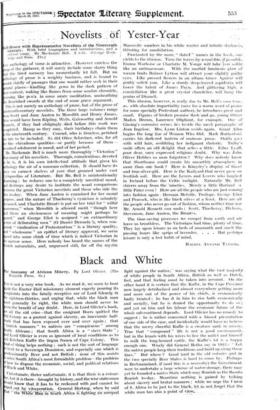_ Novelists of Yester-Year -
114-lours with Representative Novelists of thp Nineteenth Century.• With brief biographies and -introductions, and :a critical essay. By. Mackenzie Bell.. 3 vols. (George Rout7 ledge and Sons. 21s.) Ny anthology.of verse-is- attractive.. However careless the asp of the gatherer, it swill surely include some starry thing tat the tired memory has momentarily let fall. But an ethology of prose is a weighty business, and is bound to nsist chiefly of passages that one would rather seek in their tural places—kindling like gems in the dusk pattern of eir context, waking like flames from some sombre chronicle, learning like pco7s in some azure meditation, unsheathing -e flourished swords at the end of some grave argument. This is not merely an anthology of prose, but of the prose of meteentli-century novelists. The three large volumes range an Scott and Jane Austen to Meredith and Henry James. re would have been Kipling, Wells, Galsworthy and Arnold ennett, if they had obligingly_died -before this work was inpleted. Ramp as they may, their birthdays chain them the nineteenth century. Conrad, who is timeless, perished
late to be included. So did Olive Schreiner, who, for all er fine chivalrous qualities—or partly because of them -- stained adolescent in mood, and of her period.
Mr. Mackenzie Bell is much more thoroughly ." Victorian"
sin many of his novelists. - Thorough, conscientious, devoted he is, it is his own intellectual attitude that gives his ithology the air of a museum collection,. It should have its lace on earnest shelves of yore that groaned under vast velopaedias of Literature: • But- Mr. -Bell is unintentionally sarming lie reduces one to a completely uncritical mood, Id destroys any desire to institute the usual comparisons tweet' the great Victorian novelists and those who ride the its to-day. When Jane Austen is examined for her moral urpose, and the nature of Thaekeray's cynicism is minutely scussed, and Charlotte BrontE is put on her trial for " wilful c. rseness," when Meredith is alloWed" merit "though here d there an obviousness of meaning might perhaps be tired," and George Eliot is assigned " an extraordinary twer of delineating men " (0 Daniel Deronda !), when eon- stent " vindication of Protestantism " is a literary quality, nd " wholesome " an epithet of literary approval, we seem pled into some chink of time which is indeed • Victorian in
• narrow sense. -Here nobody has heard the-names of the reach naturalists, and, unguessed still, far off the mystic
• Muscovite wanders in his white wastes and-infinite darknes;:, I thirsting for annihilation.
Fascinated by the more_" dated " names in the book. one yields to the illusion. .Turn the leaves by a cpal-fire, &possible. Emma Worboise or Charlotte M. Yonge will take 'you softly
like an antimacassar. With the morbid luminous glow of waxen fruits Bulwer Lytton will attract your slightly guilty eyes. Like pressed flowers in an album Grace Aguilar- will - gently solicit you. Like a sturdy deep-leaved aspidistra will tower the talent of James Payn. And glittering high, a . constellation like a great crystal chandelier, will hang the genius of Disraeli.
This illusion, however, is really due to Mr. Bell's own tone. as, with absolute impartiality (save for a warm word of praise , for some specially Protestant author), he introduces great and small. Figures of broken promise flash and go, young Oliver Madox Brown, Laurence Oliphant, for example. One of Gissing's corrosive scenes lies beside the meek paragraphs of Jean Ingelow. Mrs. Lynn Linton scolds again. Grant Allen , begins the long line of Women Who Did. Mark Rutherford
• carries his dark-red lantern of ominous prose. Ouida govt . with wild hair, scribbling her indignant rhetoric. Trilby's smile offers an old delight that aches a little. Edna Lyall. poor dear, 'once expressed religious doubt. Why was John Oliver Hobbes so soon forgotten ? Why does nobody know that Shorthouse could create his unearthly atmosphere in more than one book ? Here is Kingsley's diSplay of tinsel and true silver-gilt. Here is the Kuilyard that never grew on Scottish soil. here are the Levers and Lovers who laughed in Ireland before the Celtic twilight. Naturally Mr. Bell shivers away from the 'nineties. Merely a little Harland --a little Pater even ! Here are all the people who are just coming into fashion again—Herman Melville, Trollope, George Eliot and Peacock, who is like black olives at a feast. Here are all the people who never go out of fashion, whom neither time nor Mr. Arnold Bennett can undo c Scott, Thaekeray, Dickens, Stevenson, Jane Austen, the Bronti:s.
The time-saving processes we compel from earth and air leave us breathless. The Victorians had time, plenty of time. They lay upon leisure as on beds of amaranth and smelt the passing hours like sprigs of lavender. . . . But perhaps leisure is only a lost habit of mind.
R.\CmMr. ANNAN') TAYLOR,.






















































 Previous page
Previous page